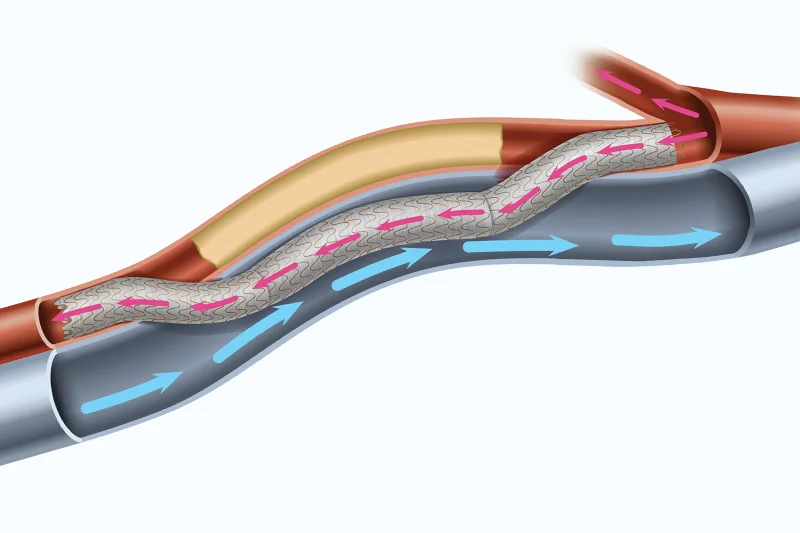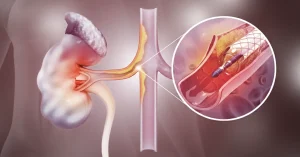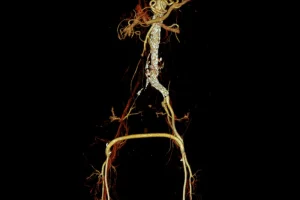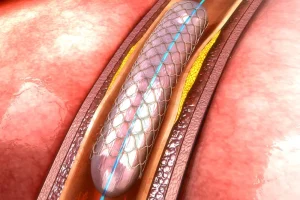Vascular Bypass
The surgical solution for restoring blood flow
Home » Vascular and Endovascular Surgery » Vascular Bypass
Medical Procedures
Vascular Techniques
Endovascular Techniques
Conditions Treated

Vascular bypass is one of the most effective procedures for restoring blood flow in severely affected arteries.
Recommended in advanced cases of peripheral arterial disease or critical ischemia, this treatment offers patients the chance to avoid severe complications such as gangrene or amputation.
By creating an alternative route, blood flow is restored, thus contributing to an improved quality of life.
Book an Appointment
What is vascular bypass?
Vascular bypass is a major surgical procedure used to redirect blood flow around a blocked or narrowed artery. The main goal of the procedure is to restore normal blood flow to tissues and organs, thus preventing severe complications such as critical ischemia, gangrene, or even loss of a limb.
During the procedure, the surgeon uses a graft, either natural (a healthy vein taken from your body) or synthetic, to create a new “route” for blood to flow freely.
This procedure is the best solution for severe conditions such as advanced peripheral artery disease or atherosclerosis, which seriously affect blood circulation.
When is vascular bypass recommended?
This procedure is indicated if:
- Severe arterial blockages cannot be treated with minimally invasive methods such as angioplasty or stenting;
- You are experiencing critical ischemia, which manifests as severe pain in the limbs, ulcers, or wounds that do not heal;
- There is a real risk of amputation due to insufficient blood flow;
- Other treatments have not been successful.
Conditions that may require vascular bypass
Vascular bypass is used to treat various conditions, including:
- Severe peripheral artery disease (PAD): Arterial blockages that restrict blood flow to the extremities;
- Advanced atherosclerosis: Thickening of the artery walls, leading to poor circulation;
- Ruptured or ruptured aneurysm: A solution for redirecting blood and preventing massive bleeding;
- Critical ischemia: Insufficient blood flow to a limb, causing pain and potential loss of the limb.
How is a vascular bypass performed?
The vascular bypass procedure involves the following steps:
- Planning and assessment: Your doctor will use advanced imaging, such as Doppler ultrasound or angiography, to assess the arterial blockages and plan the procedure.
- Anesthesia: The procedure is performed under general anesthesia, so you will not feel any pain;
- Graft harvesting: A healthy vein from your body (usually the saphenous vein) or a synthetic graft may be used to create the new pathway;
- Creating the bypass: The surgeon connects the graft to the affected artery, redirecting blood flow around the blockage;
- Closing the incisions: The procedure is completed by checking the restored blood flow and suturing the incisions.
Advantages of Vascular Bypass
At VenArt Clinic, the vascular bypass procedure is performed by a team of internationally experienced vascular surgeons using modern equipment and techniques. Choosing our clinic offers patients:
- Recognized expertise: Doctors specialized in complex vascular treatments;
- Maximum safety: Procedures performed in operating rooms equipped with state-of-the-art technology;
- Personalized approach: Each case is evaluated in detail to choose the optimal solution;
- Faster recovery: Constant support during the postoperative period to ensure a quick return to daily activities.
How to prepare for vascular bypass surgery?
Preparation for this procedure includes:
- Initial consultation: The doctor will review your medical history, recommend imaging tests, and explain the next steps.
- Preoperative tests: Blood tests and other tests will be necessary to check your overall health.
- Important recommendations: Your doctor may ask you to stop taking certain medications, such as anticoagulants, a few days before the operation.
What to expect after the procedure?
After vascular bypass surgery, it is important to follow your doctor’s instructions for a quick recovery:
- Postoperative monitoring: You will be closely monitored in the hospital to prevent complications.
- Controlled physical activity: Light walking is recommended to stimulate blood circulation.
- Specific medication: You may be prescribed anticoagulant medication to prevent blood clots.
- Follow-up consultations: Regular visits to your doctor to monitor the condition of the graft and your recovery progress.
Possible risks and complications
Like any major surgery, vascular bypass surgery may present certain risks, such as:
- Infection at the incision site;
- Infection of the prosthesis;
- Bleeding or clot formation;
- Problems with the graft, such as premature closure.
At VenArt Clinic, we take all necessary measures to minimize these risks and ensure the success of the procedure.
Why choose VenArt Clinic for vascular bypass surgery?
At VenArt Clinic, we care about your health and comfort. Our multidisciplinary team of specialists in vascular surgery, imaging, and post-operative care provides you with personalized and effective treatments. Our goal is to restore your health and quality of life.
Schedule an appointment now!
If you are experiencing severe arterial disease, don’t delay. Schedule a consultation at the VenArt Clinic and find out how vascular bypass surgery can help you regain your mobility and health.
Medical Team
Frequently Asked Questions
What is vascular bypass surgery and when is it recommended?
Vascular bypass is a surgical procedure that redirects blood flow around a blocked or narrowed section of an artery. It is recommended for severe peripheral artery disease, severe blockages of the coronary arteries, or when other treatments, such as medication or minimally invasive procedures (angioplasty), do not produce satisfactory results.
What are the main reasons why a vascular bypass is necessary?
The most common reasons include narrowing or blockages in the arteries caused by atherosclerosis, fatty deposits, or calcifications, which can reduce blood flow to essential organs and tissues. In the case of the coronary arteries, this can lead to angina, heart attack, or other serious cardiovascular complications.
How is a vascular bypass performed?
The procedure involves taking a graft (usually a vein or artery from another part of the body) and connecting it before and after the blocked area to create a new route for blood to flow normally. The operation is performed under general anesthesia and can take several hours, depending on the complexity of the case.
What types of grafts are used in vascular bypass surgery?
The most commonly used grafts are the saphenous vein (from the leg) and the internal mammary artery (from the chest). In certain situations, radial arteries (from the arm) or synthetic grafts may also be used, especially for peripheral bypasses.
What are the risks and complications associated with vascular bypass surgery?
Like any major surgery, vascular bypass surgery can involve risks such as bleeding, infection, clot formation, heart or respiratory problems. However, your doctor and medical team will take all necessary measures to minimize these risks.
How should I prepare before surgery?
Before the procedure, strictly follow your doctor’s instructions regarding any dietary restrictions, taking or stopping certain medications, and necessary tests. Tell the medical team about any pre-existing conditions or allergies and make sure you have a plan for transportation and post-operative care.
How long do the results of a bypass last and how long do the grafts work?
How long they last depends on the quality of the graft, following the doctor’s instructions, and individual factors. On average, coronary bypasses with the internal mammary artery can function effectively for 10-15 years, while saphenous veins may lose their effectiveness more quickly. Proper vascular health care can prolong the life of the grafts.
Will long-term medication or monitoring be necessary?
Yes. Most patients will need medication, such as anticoagulants or cholesterol-lowering drugs, to prevent new blockages from forming. Regular check-ups with a cardiologist or vascular surgeon will also be necessary, as well as imaging tests to monitor the condition of the bypass.
How can I reduce the risk of new blockages after surgery?
By adopting and maintaining a healthy lifestyle: quitting smoking, controlling body weight, maintaining a balanced diet, controlling blood pressure, cholesterol, and blood sugar levels, and strictly adhering to the medication schedule and medical recommendations. In addition, following cardiac rehabilitation programs and regular visits to the doctor can help prevent recurrences.








